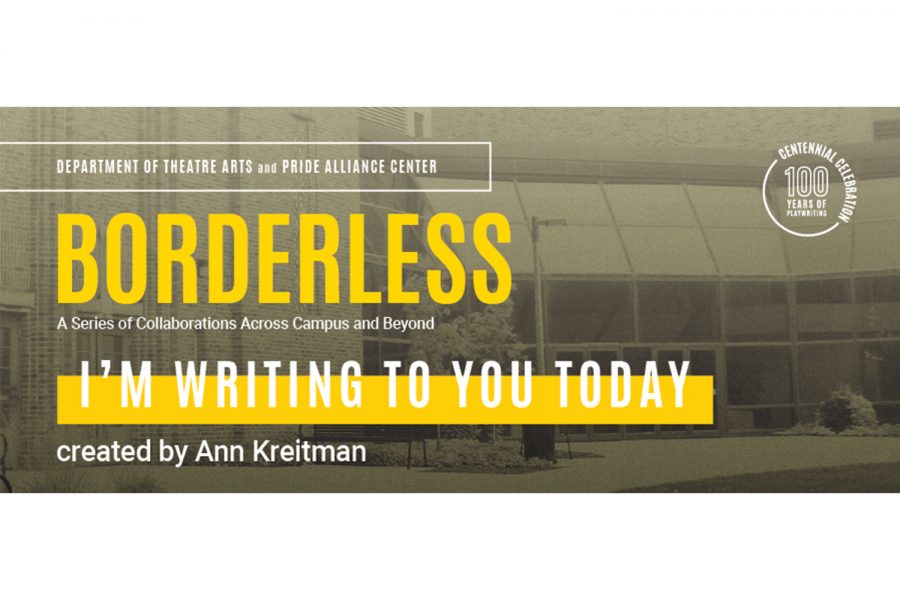UI Theatre and Cinematic Arts departments reflect on centering diversity in their programs
Cinematic Arts and Theatre Department faculty both presented new series that centered underrepresented voices in the arts. Leaders involved with each program reflected on their work thus far and their hopes for the future.
April 27, 2021
This year, Cinematic Arts and Theatre faculty at the University of Iowa launched two new series, “Black Lives on Screen” and “Borderless,” which aim to showcase diverse perspectives in the arts.
Cinematic Arts Associate Professors Paula Amad and Corey Creekmur said plans for Black Lives on Screen began last summer, partially in response to the Black Lives Matter movement and as a continuation of the department’s and, overall, the university’s ongoing diversity, equity, and inclusion efforts.
“It was in part, a response to the horrific events leading into summer 2020 and was intended as an action-based project of support for the Black Lives Matter and racial justice movements,” Amad said. “It was also part of a much broader ongoing commitment in our department that’s focused on cinema to really expand people’s understandings of the complexity of African American cinema in the past, present and future.”
While similar efforts have been made in the past, last summer’s protests led to increased diversity programming across arts programs at the university. The School of Music presented “Face Self / Face Truth: Creative Arts in Response to Social Injustice,” and took steps to address the lack of diversity in its program.
“Black Lives on Screen” is a highly collaborative series, with planning teams composed of Black faculty from various departments, students and staff involved with the Afro House, as well as graduate students.
Amad said cinematic-arts faculty wanted to focus their event budget on this series, which has allowed them to showcase the work of fellow UI artists. Amad said the school used “nearly all” of its speaker funding for “Black Lives on Screen”.
“A big part of this has been to really promote the important and transformative work being done by our colleagues here at the university,” Amad said.
Last week, “Black Lives on Screen” presented the work of Associate Professor of Cinematic Arts and experimental filmmaker Christopher Harris, who showed four of his avant-garde short films alongside other short films curated by Yasmina Price, a Ph.D. student in the departments of African American Studies and Film & Media Studies at Yale University.
Next week, Professor of poetry and Guggenheim Fellowship recipient Tracie Morris will be in conversation with Joyce Tsai, chief curator of the UI Stanley Museum of Art, about Morris’ performance of her original poem, Black Spring. Morris was commissioned by the department to write and film her performance.
Amad and Creekmur said each guest had full control over what they chose to present. The Cinematic Arts department’s job was to give them a platform, and the rest was up to the speakers. Both professors said they have been thrilled with the results.
“I think one of the things we really achieved was an impressive range of materials,” Creekmur said. “We had a session on Black Panther, a very prominent mainstream feature film, we’ve had documentaries, we’ve got experimental cinema, we’ve got intersectional films. We had a lot of goals that we were juggling. One was this range, one was bringing creators and scholars together, and another was showcasing some local talent, which is putting it mildly. I mean, it’s really outstanding.”
RELATED: UI School of Music selects first woman to direct orchestral activities
While the department’s uncertain of how events will play out next semester with COVID-19, Amad said she thinks it will continue to host Zoom webinars so non-local speakers can still be featured.
Katherine Avery, a first-year American Studies graduate student who attended some of the events, said she hopes to see more student involvement next semester.
“I do think that they have incorporated grad students into other panels, but I would like to see a little more of that,” Avery said. “I think it’s been really cool to see students engaging with professionals in our fields of choosing.”
Like the Cinematic Arts Department, the Theatre Department started a program focused on diverse stories this year. “Borderless” is a series of plays made in collaboration with campus cultural houses and community members. Each play places underrepresented voices in the spotlight.
Mary Beth Easley, chair of the Department for Theatre Arts, said she had been looking for a way to collaborate with the cultural centers on campus, when former graduate student Morgan Grambo suggested the reading of a play written by a female Native American playwright. From that idea, “Borderless” was born.
“Borderless” isn’t always presented in the typical onstage format. I’m Writing to You Today by playwright Ann Kreitman is an immersive audio journey that takes listeners across campus to locations that are significant to herself and the larger LGBTQ+ community in Iowa City. Those behind “Borderless” ensured that diverse individuals could tell their own stories.
Easley said it is important to have diverse voices on all levels of the production to ensure that their stories are told correctly, which has involved bringing in outside professionals in some cases.
“I think it is important for students to have teachers and mentors who share attributes with them, such as race, ethnicity, life experience,” Easley said. “Moving forward, our hope is to diversify our faculty. Until that happens, we will use our guest artist funds to hire mentors from the professional world. We’ve learned this year that you can mentor on Zoom, so we will continue to use that platform when it is needed.”
Easley said approximately 20 percent of the Theatre Department’s production budget went toward “Borderless.” In addition to “Borderless,” some theater graduate students began working on a project to connect theater artists globally through “Theatre Without Borders.”
Robert Ascher, a first-year dramaturg MFA student, began working to make “Theatre Without Borders” a multi-departmental collective at the university this year. He said he hopes to see a larger collaboration effort next year.
“Theatre Without Borders” was founded by theater artists Roberta Levitow, Erik Ehn, Catherine Filloux, and Deborah Brevoort following 9/11, with the goal of connecting U.S. and Middle Eastern theater artists. Now, it continues to bring artists together from around the world.
Ascher said he believes that “Theatre Without Borders” creates the opportunity to have an open dialogue about international and domestic issues through the arts.
“I feel like we’ve had a lot of conversations in the arts about gatekeepers, and who controls narratives,” he said. “It’s exciting that [“Theatre Without Borders”] are willing to be like, ‘Let’s get some young voices in this.’ And why not go as pretty much as young as possible with a public research university?”
Ascher said that arts institutions need to move beyond surface-level representation and into activism by giving underrepresented writers the opportunity to tell their own stories.
“I think that there is an expectation for people who control narratives that, well, if they put a Black best friend in this romantic comedy, that will satisfy some quota. And that doesn’t do anything,” Ascher said. “And so, I think when it comes to ‘Theatre Without Borders,’ we want people to write their lived experience, or to write something that is true to them. I think that can speak volumes.”
Between “Theatre Without Borders,” “Borderless,” and “Black Lives on Screen,” artists, faculty, and students alike have worked to increase representation within arts at the UI. Their work will continue into next semester and beyond.




